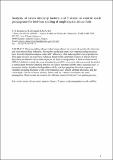Analysis of stress intensity factors and T-stress to control crack propagation for kerf-less spalling of single crystal silicon foils
Author(s)
Bouchard, P.-O.; Bernacki, M.; Parks, David Moore
DownloadManuscript-Bouchard_Revised-COMMAT2012.pdf (281.5Kb)
PUBLISHER_CC
Publisher with Creative Commons License
Creative Commons Attribution
Terms of use
Metadata
Show full item recordAbstract
Monocrystalline silicon (called mono silicon) is extensively used in the electronic and solar photovoltaic industries. During the last decade, many new manufacturing processes have been developed to improve solar cells’ efficiency while reducing their cost of production. This paper focuses on a kerf-less technique based on the controlled fracture of silicon foils by depositing an adherent stress-inducing layer on {hkl} cleavage plans. A finite element model (FEM) is defined to study the stress intensity factors (SIFs) associated with a pre-crack located at a certain depth from the interface between the silicon substrate and the stress-inducing layer. A parametric study elucidates the dependence of the crack propagation direction on process variables including thickness of the stress-inducing layer, silicon substrate thickness, and pre-crack depth. The use of stress intensity factors and the T-stress characterize the crack propagation. These results are essential for efficient control of this kerf-less spalling process.
Date issued
2013-01Department
Massachusetts Institute of Technology. Department of Mechanical EngineeringJournal
Computational Materials Science
Publisher
Elsevier
Citation
Bouchard, P.-O., M. Bernacki, and D. M. Parks. "Analysis of stress intensity factors and T-stress to control crack propagation for kerf-less spalling of single crystal silicon foils." Computational Materials Science 69 (March 2013), pp. 243-250.
Version: Author's final manuscript
ISSN
09270256